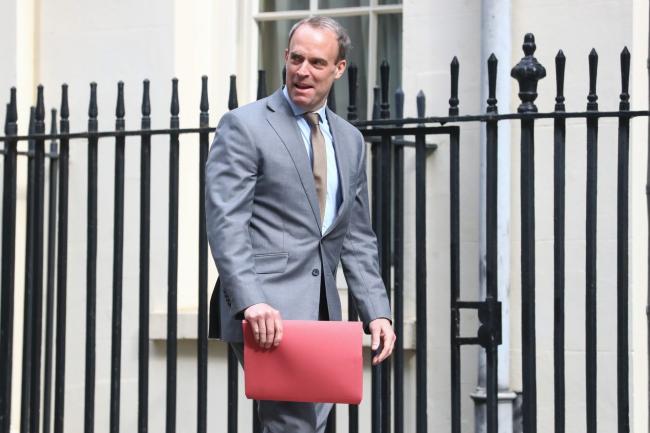(Bloomberg) -- The U.K. is about to test the risks of a wider confrontation with China that’s been a long time coming.
The next act is playing out Monday when Foreign Secretary Dominic Raab addresses Parliament. The top diplomat has dropped a heavy hint the U.K. will suspend its extradition treaty with Hong Kong, a former colony it handed back to China in 1997. The move would mark a further diplomatic escalation to a conflict that takes on the reach of Huawei Technologies Co. in post-Brexit Britain and the possibility of it sanctioning China over human rights abuses.
In a sign of growing tension, China’s ambassador to London threatened the U.K. with retaliation and accused it of bowing to U.S. pressure by banning Huawei from the U.K.’s 5G network. China also is irked by Prime Minister Boris Johnson inviting as many as 3 million Hong Kong residents to apply for U.K. citizenship.
“You have seen what happened between China and the United States,” Liu Xiaoming said on BBC Television on Sunday. “They sanctioned Chinese officials; we sanctioned their senators, their officials. I do not want to see this tit-for-tat between China-U.S. happen in China-U.K. relations.
“I think the U.K. should have its own independent foreign policy rather than dance to the tune of the Americans, like what happened to Huawei.”
The stakes extend beyond Britain. The U.K. is part of the world’s most extensive intelligence-sharing network known as Five Eyes and after parting ways with the European Union it is vying for commercial opportunities to establish its “Global Britain” brand. In China’s eyes, an unresolved Brexit could make the U.K. vulnerable.
Canada’s experience, for example, offers a cautionary blueprint.
After Canadian authorities arrested Huawei Chief Financial Officer Meng Wanzhou in 2018 at Vancouver’s airport on a U.S. extradition request, China detained two Canadians.
The two were indicted on spying charges in June and Canada has also faced trade repercussions. China stopped buying Canadian soybeans and for a while banned its pork and beef. Beyond the boycott, there was the risk of targeted cyber attacks or that Canadians traveling to China risked arrests.
Potential British targets are emerging after the U.K. government reversed itself and excluded Huawei. China’s displeasure can take multiple forms, from boiler-plate rhetoric to actions behind the scene.
Bytedance Ltd.’s TikTok, the video app that President Donald Trump has said he’s considering banning, has suspended talks to build a global headquarters in the U.K., the Sunday Times reported. Bytedance is a private company, but it has found itself in the crosshairs of Beijing’s politics abroad, such as when a skirmish in a disputed area of the China-India border saw it banned in India.
Communist Party officials, meanwhile, have warned British companies doing business in China they’re set to face retaliation over the government’s decision to stop working with Huawei, according to the report.
What seems inevitable is that U.K.-Chinese relations are likely to chill further. In a Sky News interview, Raab was asked if the two countries still enjoy a “golden era” of diplomatic relations -- a term coined five years ago by then U.K. leader David Cameron.
“It’s not a phrase I would use,” responded Raab.
Meanwhile, the pressure from the U.S. is unrelenting. Secretary of State Michael Pompeo is due in London on Monday to meet Raab and U.K. lawmakers from all main parties on topics including “the fact that China now concerns everyone,” Conservative lawmaker Bob Seely said in an interview.
Canada, the U.S., Australia and New Zealand are the other Five Eyes members. The U.S., Canada and Australia suspended the extradition treaty and New Zealand is considering it. The U.S. is locked in a superpower trade war with China, while the others have economically vital relationships with the Asian titan.
“We’re going to follow U.K. national interests and we’re going to work with our partners — try and work with China on the things where we can really accentuate the positive, but be very clear-sighted and clear-eyed about the risks and we’re going to protect our vital interests and on Hong Kong,” Raab said on Sky News on Sunday.
Liu called the ban on Huawei, which includes removing all of the Chinese company’s 5G infrastructure equipment in the U.K. by 2027, a “dark day” for the U.K.
He also warned Raab that if he seeks to impose sanctions on any individuals in China, there will be a “resolute response.”
©2020 Bloomberg L.P.

